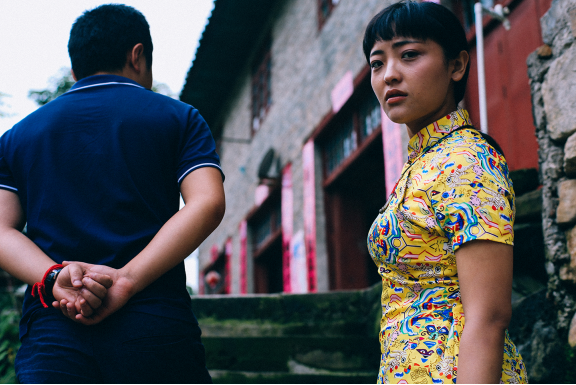
A film that I enjoyed immensely at this year’s Milwaukee Film Fest is Kaili Blues, the debut from director Bi Gan. On the one hand, I didn’t feel it was entirely successful as a complete film, but on the other hand, I loved it.
The impression I had gathered from reviews before going to see Kaili Blues was that it had impressive visuals, involving a lot of rural Chinese landscape, but an incomplete story. While this is more or less true, this is also exactly the type of movie I feel you should go to a festival to see: It begs to be viewed on the big screen and allows you the feeling of being in on some phenomenon, something that’s happening now in a jagged and imperfect but truly exciting way.
It also turns out that the story in itself isn’t so lacking or uninteresting—the movement of the plot just isn’t threaded very evenly throughout, and it isn’t revealed in a way that the viewer can entirely grasp or get behind as it unrolls. The film centers around a man named Chen who takes what turns out to be a rather mystical journey to track down his nephew Weiwei. He first believes Weiwei has been sold into slavery by his father, Chen’s unsavory brother—in any case Weiwei has been sent away, and Chen takes it upon himself to find him.
One of the most notable features of Kaili Blues is a 41-minute-long handheld take that leads around a riverside village. During the shot, the river is crossed and crossed back again, a song is sung, a story is told, the person being followed by the camera is switched and switched back again. A motor-scooter, pickup truck and boat are put to use. Behind it all is a lush mountain backdrop and a sunless, impenetrable, whitish-gray sky. This shot creates an incredible sense of motion that I wished could have been integrated into the rest of the movie, but which was worth seeing in itself.
The word “dreamy” is used often when talking about visually arresting movies, but this is one of the rare movies that I feel has entirely earned this descriptor, along with The Fits, which I’m coming to in my next post. The long take from Kaili Blues is like real dreams I’ve had. It’s not certain, in this section of the movie, whether Chen is really dreaming, time-traveling or dead. In it, he meets a young man named Weiwei who is perhaps his nephew, last seen as a kid.
Dreams or possible dreams portrayed in movies seem often to be straightforward fantasies or surrealistic, frightening displays that build on the classic “walking-around-naked” nightmare. But the dreams you actually have often tend to feel perfectly natural before you wake up, readjust to life and try to explain them to someone, and this is the feeling Kaili Blues brings across.
Any thoughts on the afterlife of festival films, especially this one? Some will be available to stream at some point in time, but others, this one for example, should be seen on a big screen.
LikeLike
Oh, I’d still recommend seeing it! Just sit really close to the TV. 🙂
LikeLike